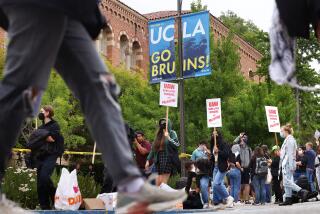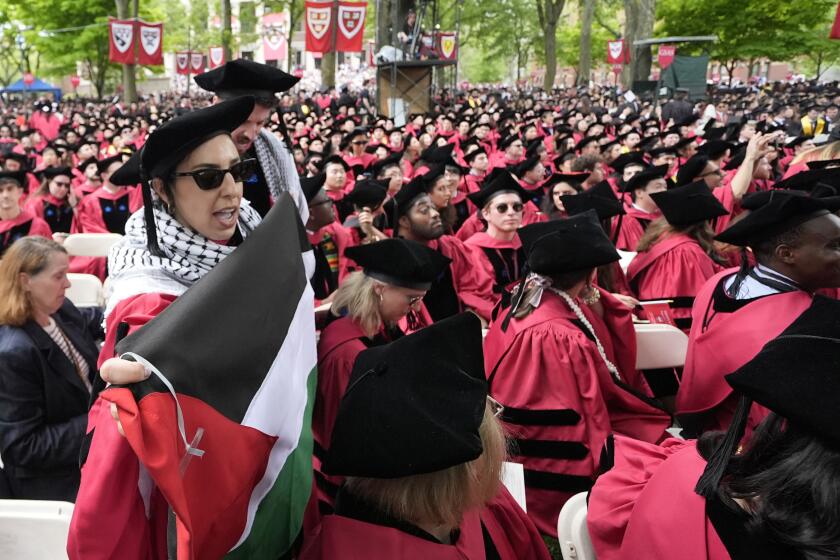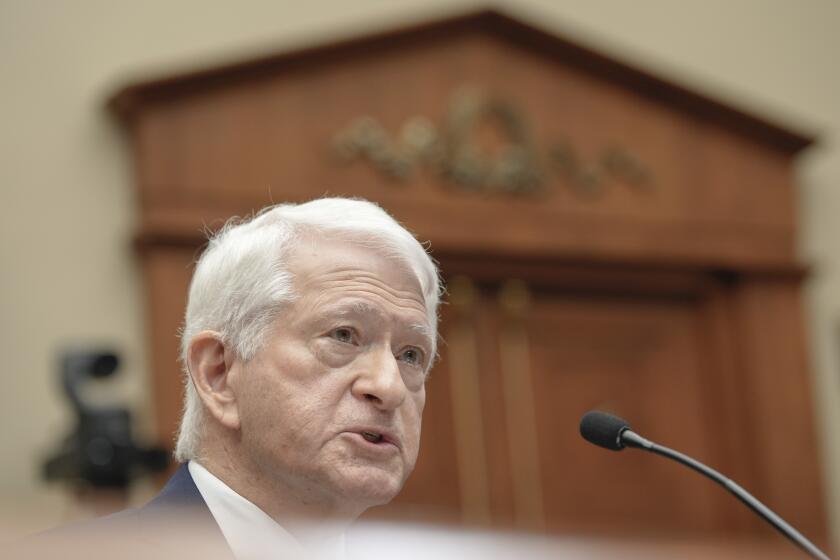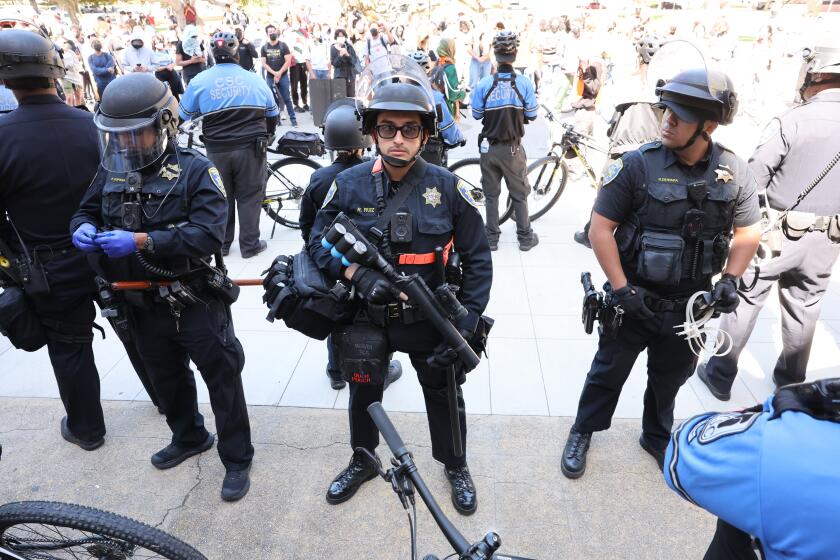Cal State Faculty Picket Trustees Over Contract Stalemate : Education: The first protest at headquarters in more than a decade cites budget cutbacks and a dispute over how raises are awarded.
Donning costumes and waving handwritten signs, more than 100 faculty and staff members from 18 campuses picketed the California State University Board of Trustees meeting Tuesday to draw attention to an ongoing contract dispute over salaries and workload.
“What do you want? A contract! When do you want it? Now!” the picketers--many in black mortarboards--chanted as they rallied in front of the university’s Long Beach headquarters. Organizers said it was the first faculty demonstration there in more than a decade.
Some of the protesters’ placards lamented the overall decrease in state funding for higher education; one said “Universities, Not Prisons.” But the financial issue that appeared to motivate most of the people who walked in circles under a hot sun was a much more personal one. As one woman’s sign proclaimed: “Ph.D. Professor: $10 / hour.”
Last month, after nearly a year of contract negotiations, the university reached an impasse with the California Faculty Assn., the union that represents 18,000 Cal State employees. At the heart of the disagreement is a proposed performance-based compensation system that Cal State Chancellor Barry Munitz says would better reward employees for a job well done.
Faculty negotiators, while agreeing to the concept, have balked at some of the specifics. The university has proposed a 1.2% across-the-board raise to be supplemented with merit pay. The faculty union wants 2%. The university wants decisions about faculty raises, while informed by a peer review process, to ultimately be approved by campus presidents. The faculty union wants to be able to formally challenge those decisions by appealing to a neutral arbitrator.
“We’re afraid if the president has total power as to who gets raises and who doesn’t, it’s an ‘I scratch your back, you scratch mine situation,’ ” said Rick Gutierrez, a psychological counselor at San Francisco State who was among the protesters.
With that, Gutierrez, who wore green pointy ears and a sign that said “Merit Master,” ran a plastic back scratcher down the spine of Bill Littell, a professor emeritus of psychology at San Francisco State.
With a theatrical flourish, Littell responded on cue: “You get a raise.”
By the administration’s own reckoning, Cal State faculty members are paid about 10% less than those at comparable institutions. Since 1990, professors have received a single raise averaging 4.3%, officials said.
Since the impasse was declared, three bargaining sessions have been held with a mediator. Sam Strafaci, Cal State’s senior director of employee relations, said that he hopes an agreement can be reached at the fourth session this Friday. But he noted that the two sides’ proposals now differ by about $9 million for just the 1995-1996 fiscal year.
“There are still considerable differences,” said Gerie Bledsoe, the union’s chief negotiator. “It’s disappointing.”
Inside the board room, meanwhile, the trustees heard from union leaders, who submitted a letter suggesting that the contract dispute was detracting from the university’s broader purpose.
“Somehow we must put these issues behind us so we can concentrate on not only saving the university, but providing greater access to a high-quality education to our students,” the letter said.
The issue of access came up again later in the day, as Munitz engaged the trustees briefly on the topic of affirmative action. Addressing a handful of proposed bills and initiatives that address race- and gender-based preferences, Munitz predicted that if they pass, Cal State will continue to function very much as it does today.
Even under the so-called California civil rights initiative, which would forbid preferential treatment based on race or sex in public hiring, contracting and student admissions, Munitz said, “95% to 98% of what we now do we could and would continue doing.” He added that the initiative could affect the University of California differently because it has substantially more applications per available spot and must use a variety of criteria to choose among them. Cal State, by contrast, is generally open for all qualified applicants.
“I don’t mean that to say it’s a weak initiative. . . . I hope this doesn’t cause our faculty at Hayward to rewrite the initiative again,” added Munitz, referring to one of the initiative’s authors, who is a faculty member at Cal State Hayward. “But as best we can tell . . . whatever the goal of this initiative seems to be--to eliminate unhealthy things--we don’t seem to be in that net.”
More to Read
Start your day right
Sign up for Essential California for news, features and recommendations from the L.A. Times and beyond in your inbox six days a week.
You may occasionally receive promotional content from the Los Angeles Times.






